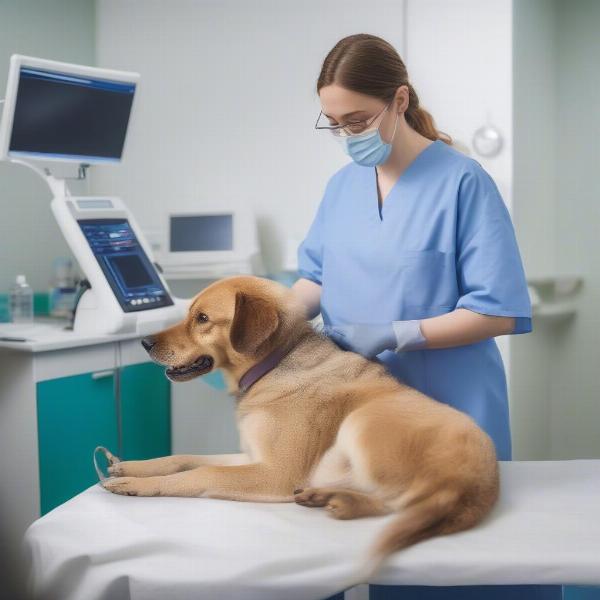Boar’s Head hot dogs are a popular lunchtime choice for many, but can your canine companion safely enjoy them too? While a small nibble might not cause immediate harm, regularly feeding your dog Boar’s Head hot dogs, or any hot dogs for that matter, is generally not recommended. These processed meats are often high in sodium, fat, and contain various additives that aren’t beneficial for a dog’s health. Let’s explore healthier alternatives and understand why hot dogs aren’t ideal for our furry friends.
Why Boar’s Head Hot Dogs Aren’t Ideal for Dogs
Although Boar’s Head is known for its high-quality deli meats, their hot dogs still fall into the category of processed foods. These products often contain high levels of sodium, which can lead to dehydration, increased thirst, and even sodium ion poisoning in dogs. The high fat content can contribute to pancreatitis, a serious and potentially life-threatening condition. Additionally, many hot dogs contain seasonings, preservatives, and other additives that can upset a dog’s stomach or cause allergic reactions. Onions and garlic, common flavorings in some hot dogs, are particularly toxic to dogs.
Healthier Alternatives to Boar’s Head Hot Dogs
Instead of offering your dog Boar’s Head hot dogs, consider healthier and safer treats. Small pieces of cooked, lean meats like chicken, turkey, or beef are good options. Always ensure the meat is unseasoned and boneless. Fruits and vegetables like carrots, apples (without the core and seeds), and blueberries can also make nutritious and enjoyable snacks. For commercially produced treats, look for options specifically formulated for dogs with high-quality ingredients and limited additives.
Can Dogs Eat Other Types of Hot Dogs?
The concerns about Boar’s Head hot dogs apply to most other brands as well. Whether it’s beef, pork, or chicken hot dogs, the high sodium, fat, and additive content make them an unsuitable regular treat for dogs. While a tiny piece might not be immediately harmful, consistent consumption can lead to long-term health problems.
What to Do If Your Dog Eats a Boar’s Head Hot Dog
If your dog snatches a bite of your Boar’s Head hot dog, don’t panic. A small amount is unlikely to cause serious harm. Monitor your dog for any signs of gastrointestinal upset, like vomiting, diarrhea, or loss of appetite. If these symptoms persist or worsen, contact your veterinarian immediately.
 Veterinarian examining a dog.
Veterinarian examining a dog.
Choosing Safe and Healthy Treats for Your Dog
Providing your dog with a balanced diet and appropriate treats is crucial for their overall health and well-being. Opt for natural, wholesome snacks that are low in sodium, fat, and additives. Always check the ingredient list and consult your veterinarian if you have any concerns about a particular treat.
Are There Any Benefits to Feeding Dogs Hot Dogs?
There are no nutritional benefits to feeding dogs hot dogs. While they might be a tempting and convenient treat, the potential risks outweigh any perceived rewards. Prioritize your dog’s health by choosing nutritious alternatives that support their long-term well-being.
Conclusion
While a small piece of Boar’s Head hot dog might not be immediately dangerous for your dog, it’s best to avoid feeding them this processed meat altogether. The high sodium, fat, and additive content can pose significant health risks over time. Choose healthier alternatives like lean meats, fruits, vegetables, or dog-specific treats to keep your furry friend happy and healthy.
FAQ
- What should I do if my dog eats a whole Boar’s Head hot dog? Contact your veterinarian immediately, as large amounts can be harmful.
- Are there any hot dogs safe for dogs? No, all hot dogs generally pose the same health risks for dogs.
- What are some good alternatives to hot dogs for dog treats? Lean meats, fruits, vegetables, and dog-specific treats are excellent choices.
- Can hot dogs cause pancreatitis in dogs? Yes, the high fat content can contribute to pancreatitis.
- Why is sodium bad for dogs? Excessive sodium can lead to dehydration and other health issues in dogs.
- Can dogs have onions or garlic? No, onions and garlic are toxic to dogs and should be avoided.
- What are the signs of sodium poisoning in dogs? Vomiting, diarrhea, tremors, and seizures can be signs of sodium poisoning.
ILM Dog is a leading international dog website dedicated to providing expert advice on all aspects of dog care and well-being. We offer valuable resources and information on dog breeds, health, training, nutrition, grooming, and much more. For expert guidance and support in caring for your canine companion, contact us at [email protected] or call us at +44 20-3965-8624. ILM Dog is your trusted source for all things dog-related.